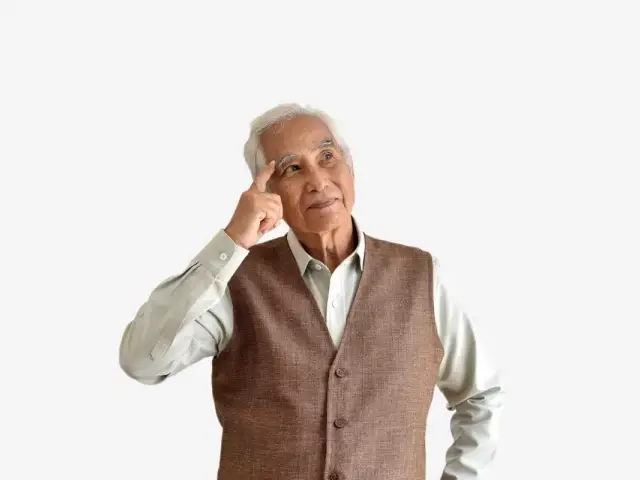The actor Meryl Streep once said: “One day you wake up and realize that your youth is gone, but along with it, so go insecurity, haste, and the need to please. . . . You learn to walk more slowly, but with greater certainty. You say goodbye without fear, and you cherish those who stay. Aging means letting go, it means accepting, it means discovering that beauty was never in our skin . . . but in the story we carry inside us.”
That quote captures the two sides of getting older—and points to the formula for aging well: to grieve and reconcile yourself to what is being lost while learning to see and acknowledge what you have gained. There is a third component as well, which involves cultivating meaning, purpose, and optimism as your life evolves. That, at least, is the upshot of the science we’ve covered for decades now.
For this resource page, we’ve gathered the best and most enduring of our articles, podcasts, and videos about getting older. We’ve also included content about caregiving, which is so essential to spouses aging together or those who must care for elders through all their ups and downs. These are journeys most of us must make, sooner or later, if we live long enough. The good news is that we don’t need to take them alone.
Click to jump to a section:
Advertisement
X
Keep Up with the GGSC Happiness Calendar
Consider forgiveness this month
How Getting Older Makes You Feel
How Aging Shapes Relationships
- Why Relationships Are the Secret to Healthy Aging: A new book outlines why our brains and bodies need social connections to age well.
- How Relationship Satisfaction Changes Across Your Lifetime: Our romantic happiness goes through normal ups and downs as we get older—and we’re least happy around age 40, a new study finds.
- How Friends Help Us Grow Old: A new study suggests that we need a lot of social contact when we’re younger—but as we age, we need to focus on closeness.
- How Loneliness Changes Across Your Lifetime: Loneliness can strike at any age, although the cause might be different.
- How Polyamorous People Can Find Happiness in Later Life: Two new books explore what it looks like for people in multiple romantic partnerships to get older.
- What The Golden Bachelor Reveals About Searching for Love as We Age: The Golden Bachelor, while imperfect, brings up questions about desire and desirability and the ageist and sexist narratives we hold about them.
- Why Sex Gets Better in Old Age: According to a new study, our sexual priorities change as we age and that keeps our sex lives satisfying.
- Find Purpose by Connecting Across Generations: Relationships with people of different ages can bring meaning, joy, and a better world.
- What Happens When Old and Young Connect: When older and younger people form meaningful relationships, it improves both groups’ well-being.
- How Music Can Bridge Generational Differences: With so much driving us apart, music offers opportunities for solace and bridge-building.
Navigating Middle Age & Menopause
“Statistically speaking, the two most important personality correlates that predict successful aging are conscientiousness and openness to experience. ”
Tips & Insights for Retirement & Better Aging
Caring for Elders & Each Other
- What Happened When I Wrote My Mom a Thank-You Letter: When she turned 50, Nancy Davis Kho wrote 50 gratitude letters—and the first one was to her mom.
- Can Music Help Keep Memory Alive?: A conversation with the makers of Alive Inside, a new documentary about how music is helping people with dementia.
- Happy Caregivers May Help Dementia Patients Stay Alive: A new study finds that supporting the mental health of family caregivers could lead to longer, happier life for dementia patients.
- How to Give to Others Without Burning Out: Research suggests that self-care can reduce stress and exhaustion—if we know how to practice it.
- Can Altruism Help Us Through Hard Times?: Caring for others can improve our well-being, build resilience, and foster lasting community—during moments of collective crisis, and beyond.
- How Awe Helps You Navigate Life’s Challenges: We explore how embracing awe can uplift caregivers, providing tools to nurture themselves while nurturing others.
- How Caregivers Can Cultivate Moments of Positivity: Judith Moskowitz explains how positive emotion skills can help us cope with stress.
- How to Stay Empathic Without Suffering So Much: Four steps to a healthier, more helpful, and more sustainable form of empathy.
- Can Mindfulness Help Caregivers Care for Themselves?: A new study explores if moment-to-moment, nonjudgemental awareness can help people caring for profoundly disabled children.
“There are two main ways that people on their deathbeds find meaning: in the recognition of all of the people they have loved and who have loved them, and in the work that they’ve done that has contributed to the greater good.”
How to Die Well

